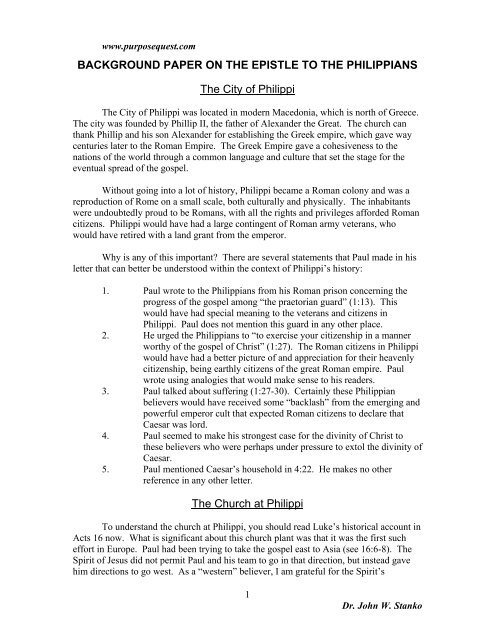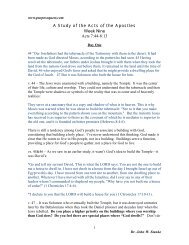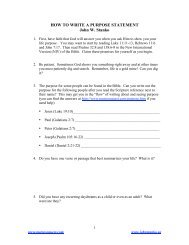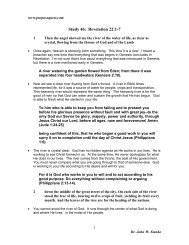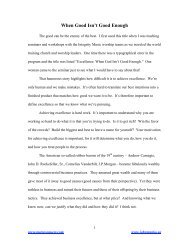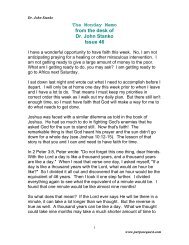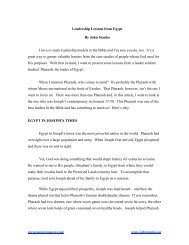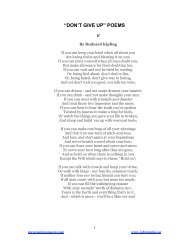BACKGROUND PAPER ON THE EPISTLE TO ... - Dr. John Stanko
BACKGROUND PAPER ON THE EPISTLE TO ... - Dr. John Stanko
BACKGROUND PAPER ON THE EPISTLE TO ... - Dr. John Stanko
You also want an ePaper? Increase the reach of your titles
YUMPU automatically turns print PDFs into web optimized ePapers that Google loves.
www.purposequest.com<br />
<strong>BACKGROUND</strong> <strong>PAPER</strong> <strong>ON</strong> <strong>THE</strong> <strong>EPISTLE</strong> <strong>TO</strong> <strong>THE</strong> PHILIPPIANS<br />
The City of Philippi<br />
The City of Philippi was located in modern Macedonia, which is north of Greece.<br />
The city was founded by Phillip II, the father of Alexander the Great. The church can<br />
thank Phillip and his son Alexander for establishing the Greek empire, which gave way<br />
centuries later to the Roman Empire. The Greek Empire gave a cohesiveness to the<br />
nations of the world through a common language and culture that set the stage for the<br />
eventual spread of the gospel.<br />
Without going into a lot of history, Philippi became a Roman colony and was a<br />
reproduction of Rome on a small scale, both culturally and physically. The inhabitants<br />
were undoubtedly proud to be Romans, with all the rights and privileges afforded Roman<br />
citizens. Philippi would have had a large contingent of Roman army veterans, who<br />
would have retired with a land grant from the emperor.<br />
Why is any of this important? There are several statements that Paul made in his<br />
letter that can better be understood within the context of Philippi’s history:<br />
1. Paul wrote to the Philippians from his Roman prison concerning the<br />
progress of the gospel among “the praetorian guard” (1:13). This<br />
would have had special meaning to the veterans and citizens in<br />
Philippi. Paul does not mention this guard in any other place.<br />
2. He urged the Philippians to “to exercise your citizenship in a manner<br />
worthy of the gospel of Christ” (1:27). The Roman citizens in Philippi<br />
would have had a better picture of and appreciation for their heavenly<br />
citizenship, being earthly citizens of the great Roman empire. Paul<br />
wrote using analogies that would make sense to his readers.<br />
3. Paul talked about suffering (1:27-30). Certainly these Philippian<br />
believers would have received some “backlash” from the emerging and<br />
powerful emperor cult that expected Roman citizens to declare that<br />
Caesar was lord.<br />
4. Paul seemed to make his strongest case for the divinity of Christ to<br />
these believers who were perhaps under pressure to extol the divinity of<br />
Caesar.<br />
5. Paul mentioned Caesar’s household in 4:22. He makes no other<br />
reference in any other letter.<br />
The Church at Philippi<br />
To understand the church at Philippi, you should read Luke’s historical account in<br />
Acts 16 now. What is significant about this church plant was that it was the first such<br />
effort in Europe. Paul had been trying to take the gospel east to Asia (see 16:6-8). The<br />
Spirit of Jesus did not permit Paul and his team to go in that direction, but instead gave<br />
him directions to go west. As a “western” believer, I am grateful for the Spirit’s<br />
1<br />
<strong>Dr</strong>. <strong>John</strong> W. <strong>Stanko</strong>
www.purposequest.com<br />
missionary direction! Many have said that the gospel has spread westward since that<br />
time, and will continue to do so until it returns to where it started—in the Middle East.<br />
Let it be so, Lord Jesus.<br />
Paul received his “call” to go west in a night vision. “During the night Paul had a<br />
vision of a man of Macedonia standing and begging him, ‘Come over to Macedonia and<br />
help us.’ After Paul had seen the vision, we got ready at once to leave for Macedonia,<br />
concluding that God had called us to preach the gospel to them” (Acts 16:9-10). Some<br />
believe that the man in the vision was the jailer who played such an important role in the<br />
mission to Philippi (see 16:31-40), but that cannot be proved from the Bible account.<br />
It is of note that Paul and his team “got ready at once” to go to Macedonia. They<br />
concluded that God wanted them to go there. In other words, Paul and his team used<br />
their brains. They reasoned that God wanted them to preach the gospel somewhere.<br />
Since they had been trying to do just that but felt resisted, they assumed that this vision<br />
was from God. The whole team received the vision, even though Paul was the only one<br />
who saw the man calling him over. They didn’t “pray about it,” but rather they set out<br />
immediately. I recently received an email from someone who stated in the email that the<br />
Lord had been dealing with him for eight weeks, eight weeks mind you, to send out the<br />
email. So much for an immediate response! And that over sending an email!<br />
There was obviously no synagogue in Philippi, for on the Sabbath Paul and his<br />
team went out to the river where there was a place of prayer. Jewish law stipulated that if<br />
there were 10 Jewish males in an area, a synagogue could be formed. I would assume<br />
there were no Jews in Philippi. Perhaps the same persecution of Jews that was taking<br />
place in Rome was also happening in this Roman colony. At any rate, Paul went looking<br />
for a place where devout God-fearers would gather. He obviously knew where to look<br />
and found them praying.<br />
Paul’s first convert was Lydia, a dealer in purple cloth. This purple cloth was<br />
very expensive, the dye coming from the throat of a local shellfish. It is reported that<br />
there was only one drop of this purple dye in each fish, so you can be sure that Lydia was<br />
wealthy from distributing this expensive purple cloth.<br />
Notice the phrase: “The Lord opened her heart to respond to Paul’s message.”<br />
God opened her heart, but she still needed to respond. There were three people involved<br />
here: the Lord, Lydia and Paul and all three had a role in her conversion. Salvation work<br />
is never dependent on one person only; it always requires a team effort.<br />
At any rate, Lydia is converted and she prevailed upon Paul and his team to stay<br />
at her house. We can assume I think that others were converted after this. As Paul would<br />
make his way to river prayer location, there was a slave-girl who had a python, the Greek<br />
word for a spirit of divination. Notice that this girl was declaring the truth that Paul and<br />
his team were “bondservants of the Most High God.” But this annoyed Paul who<br />
eventually cast the spirit of divination out of her. It seems that truth isn’t the issue, but<br />
the source of the truth is more important. Note the difference between this slave-girl and<br />
2<br />
<strong>Dr</strong>. <strong>John</strong> W. <strong>Stanko</strong>
www.purposequest.com<br />
Lydia. Both had truth, but one had it from God and the other had it from the devil. The<br />
slave-girl knew the truth from a demonic source, and Paul could not let that continue. Do<br />
you know anyone who has the truth, but got it from an illicit spiritual source?<br />
Now the trouble began. It is of note that Paul’s first trouble in Philippi was not<br />
essentially religious, but economic. The owners of the slave-girl made money from her<br />
divination and now Paul had cast out the means of her revelation. So her owners were to<br />
suffer economic loss and they were angry. They dragged Paul and Silas before the<br />
magistrates and before long, the crowd had stripped and beaten the two men. The<br />
authorities then put Paul and Silas in prison, entrusting them to the care of the Philippian<br />
jailer, who was probably a Roman veteran.<br />
Now the fun really began. At midnight, Paul and Silas were singing hymns, an<br />
amazing testimony for men in their condition. Suddenly there was an earthquake and we<br />
have no reason to believe that this quake only took place in the jail area. I would think<br />
that the whole city felt it. During the earthquake, all the shackles and irons fell off the<br />
prisoners’ arms and legs. The jailer, seeing what had happened, assumed that they had<br />
escaped and prepared to kill himself rather than face the humiliation of having failed in<br />
his duties.<br />
But Paul urged him to restrain his hand and Paul was able to lead the jailer and his<br />
household to Jesus. When the officials came to send Paul away the next day, Paul<br />
refused to go. Paul was a Roman citizen and had been flogged without a trial, a serious<br />
offense against him. The officials did come personally to see him off, being much<br />
relieved when the incident was behind them. Having said farewell to the church in<br />
Lydia’s home, Paul and his team departed Philippi.<br />
Philippians the Epistle<br />
Now it is ten years after the story in Acts 16 took place. Paul found himself in<br />
prison again, this time for an extended period of time in Rome. He made the most of this<br />
break in his travel schedule by writing the prison epistles, generally believed to be<br />
Philemon, Ephesians, Colossians and Philippians. These would have been written about<br />
10 years after Paul founded the Philippian church.<br />
There are a few things that stand out about this letter to the Philippians. First, is<br />
how vulnerable and honest Paul was to this church. His love and intimacy with them is<br />
evident. He shared his thoughts and feelings, writing freely about death, ministry,<br />
suffering, finances and Jesus. You could almost say that Paul had a special love affair<br />
with the Philippians. Perhaps it was the suffering that he encountered when he first came<br />
to Philippi. Or maybe the receptivity of the people made his memories of them so<br />
special. Whatever the reason, Paul’s Philippian letter did not contain the rebukes of<br />
Galatians, the chastisement of Corinthians or the concern of Colossians. This was<br />
brother Paul writing his friends and coworkers in Philippi.<br />
3<br />
<strong>Dr</strong>. <strong>John</strong> W. <strong>Stanko</strong>
www.purposequest.com<br />
The second thing that stands out is Paul’s joy. He is in prison, yet he wrote to the<br />
Philippians to encourage them! In some ways, they were in worse shape over his<br />
condition than he was. Paul wrote to them about the joy of suffering, about how God was<br />
using his imprisonment to further the gospel, and about how they needed to rejoice in the<br />
Lord at all times! There was no complaining or attempts to gain sympathy. Paul wanted<br />
them to know that he was in fine spirits, even though in prison.<br />
The final thing that stands out is Paul’s disdain for anyone who would try to undo<br />
what he has done in building the church. He called those people “dogs” who did evil<br />
(3:2). He solemnly warned the Philippians to avoid those who were “enemies of the<br />
cross of Christ.” (3:18). He even sent their emissary Epaphroditus, whom they had sent<br />
to minister to Paul, back to them so that they would not be concerned about him. Paul<br />
exhibited a pastor’s heart for his flock and worked diligently to build them up and not<br />
burden or tear them down.<br />
In conclusion, the letter to the Philippians gives us an intimate picture of Saint<br />
Paul the prisoner, the pastor and apostle. He was writing his favorite church about what<br />
it was like to serve the Lord as a church planter and leader. While the letter was<br />
addressed to all the church, he made sure to include the leaders. That was because he<br />
shared so many secrets of successful, godly leadership as he wrote the letter. Finally,<br />
Paul gave us a picture of noble and joyous service in the midst of pressure and suffering,<br />
another important lesson for leaders and followers alike. May the Lord bless the reading<br />
of His word as you now begin your 28 day stuffy of Philippians.<br />
4<br />
<strong>Dr</strong>. <strong>John</strong> W. <strong>Stanko</strong>


